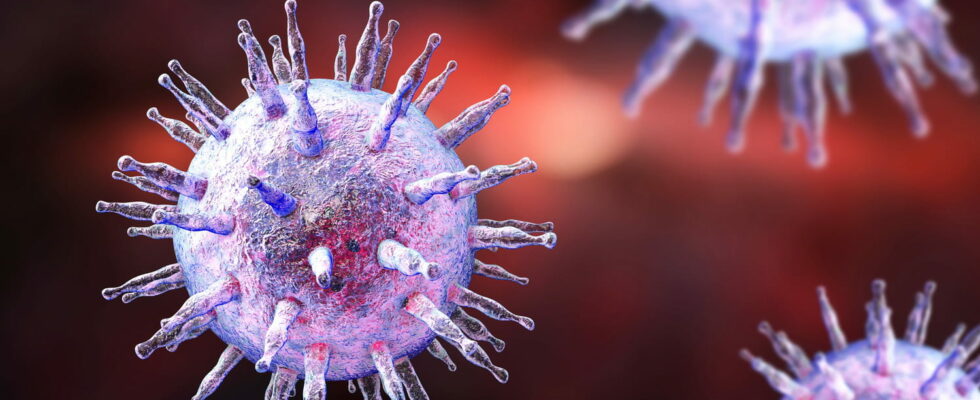Burkitt’s lymphoma is a very rapidly growing (aggressive) non-Hodgkin’s lymphoma. Among the causes: the Epstein-Barr virus (EBV). Symptoms, course, treatment and life expectancy.
Burkitt’s lymphoma is a malignant tumor of the lymphatic system. It is a type of B lymphoma aggressive non-Hodgkinian which can affect both adults and children. Chemotherapy is the reference treatment. How to detect Burkitt’s lymphoma? What are the symptoms ? Is it dangerous ? What life expectancy with Burkitt’s lymphoma?
What is Burkitt’s Lymphoma?
Burkitt’s lymphoma is so called because it was first described by Denis Burkitt, a British surgeon, in 1958. Several forms of Burkitt’s lymphoma exist:
► Endemic Burkitt’s lymphoma” also called African Burkitt’s lymphoma since it manifests itself especially in Africa, linked to the Epstein-Barr virus (EBV), and classically presenting itself in the form of a tumor of the jaw;
► Sporadic Burkitt’s lymphoma, most often unrelated to EBV, and developing especially in the abdomen. This is the most common type in Europe and North America.
► The Burkitt’s lymphoma linked to immunodeficiency for people with weakened immune systems, usually those with HIV infection. It is usually not associated with the Epstein-Barr virus.
What are the symptoms of Burkitt’s lymphoma?
Symptoms of Burkitt’s lymphoma include:
- A rapid increase in the size of the abdomen (a few days or a few weeks) .
- stomach aches
- Vomitings
- Even an intestinal obstruction
- Sometimes a lump in a lymph node, organ, or throat.
- Rarely weight lossfever, sweating or extreme fatigue as in other lymphomas.
What causes Burkitt’s lymphoma? A virus ?
As with most cancers, the exact cause of Burkitt’s lymphoma is not known. “EBV virus is still associated with “endemic” African Burkitt, but the mechanism of tumor transformation is unclear (EBV virus causing infectious mononucleosis affects many people but very few develop lymphoma)“, explains Dr. Véronique Minard-Colin, Child and Adolescent Cancer Department at Gustave Roussy. People whose immune defenses are weakened (after treatment or during different diseases) have a higher risk of developing Burkitt’s lymphoma.
Is Burkitt’s lymphoma contagious?
Burkitt’s lymphoma is not contagious.
What is the life expectancy with Burkitt’s lymphoma?
Thanks to advances in diagnosis, supportive care, chemotherapy, and the introduction of rituximab, cure rates are over 95% in children and 80% in adults. Relapses are rare and occur during the first year following diagnosis. “For forms of Burkitt’s lymphoma resistant to treatment, new drugs are being studied such as genetically modified T lymphocytes and educated to destroy tumor cells (immunotherapy CAR T-cells)“, concludes the doctor.
What are the risks of complications from Burkitt’s lymphoma?
“The disease can spread quickly to the bone marrow (about 35% of cases) and to the central nervous system (about 15% of cases). Tumorous meningitis may then appear or paralysis of the cranial nerves“, notes the specialist. In the most advanced stages, the extension to the bone marrow is very important and the clinical picture is that of an acute leukaemia.
Who are the people at risk? (age, ethnicity)
In France, Burkitt’s lymphoma most often affects children or young adults and rarely older adults. It affects boys more and accounts for approximately half of childhood non-Hodgkin’s malignant lymphomas (50-60 cases/year/France) and approximately 2% of those in adults (250-300 cases/year/France). “Patients infected with the HIV virus and whose antiviral treatment is not optimal (weakened immune defenses) are particularly likely to develop Burkitt’s lymphoma“, observes our interlocutor.
The diagnosis is made on a biopsy of a lump or bone marrow confirming the presence of tumor cells. Microscopic analysis must be rapid (24-48 hours) to initiate treatment as soon as possible. Medical imaging (ultrasound, scanner) is essential to complete the initial assessment.
The management of this type of lymphoma must be carried out in a center specializing in oncology/haematology. The diagnosis of Burkitt’s lymphoma requires emergency treatment. Treatment is most often based on intensive chemotherapy with rituximab (monoclonal antibody directed against B lymphocytes) but it is also possible to administer targeted treatment. Surgery is exceptional in diagnosis or in treatment. There is no indication for radiotherapy. “At the start of treatment, metabolic problems (release into the blood by the lysed tumor cells of molecules “toxic” for the organs) are frequent, requiring hydration and close care.“, details Dr. Minard-Colin. The treatment is intense and short (3 to 6 months in total depending on the stage) and associated with significant acute toxicity (hair loss, fatigue, drop in blood cells, risk of infections, mouth ulcers). However, there are few long-term sequelae induced by the disease and the treatments.
Thanks to Doctor Véronique Minard-Colin, Child and Adolescent Cancer Department of Gustave Roussy.
